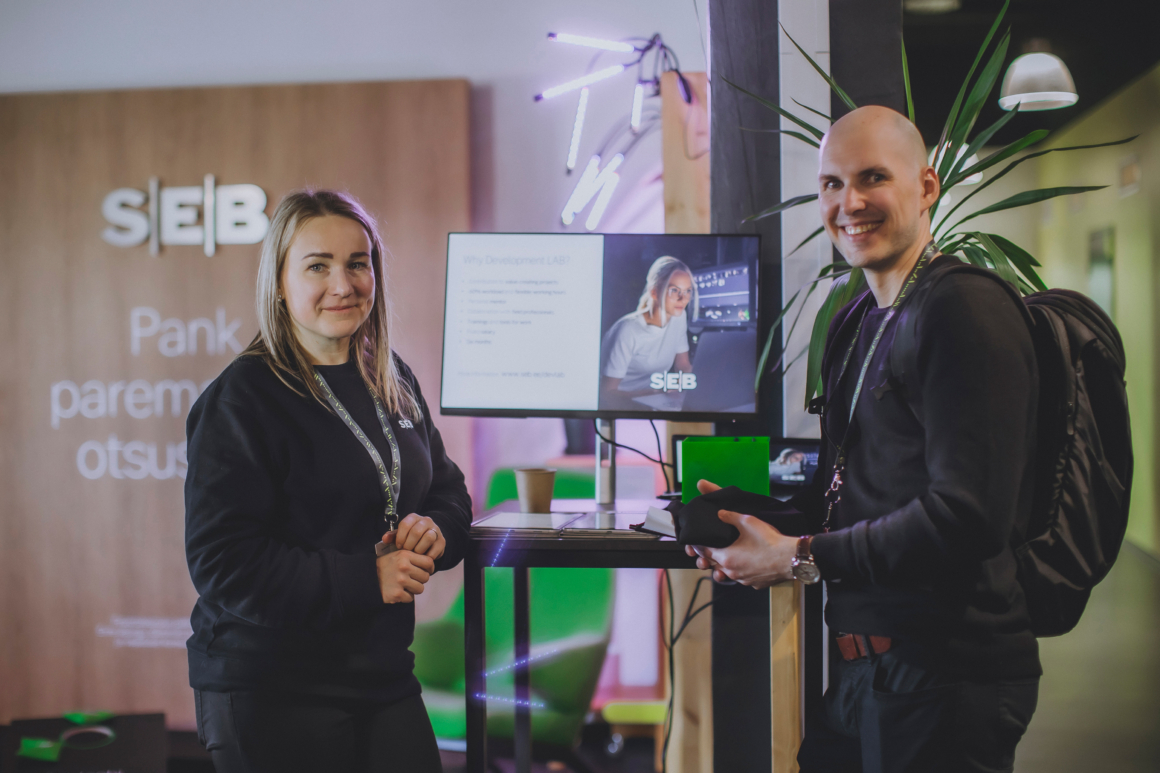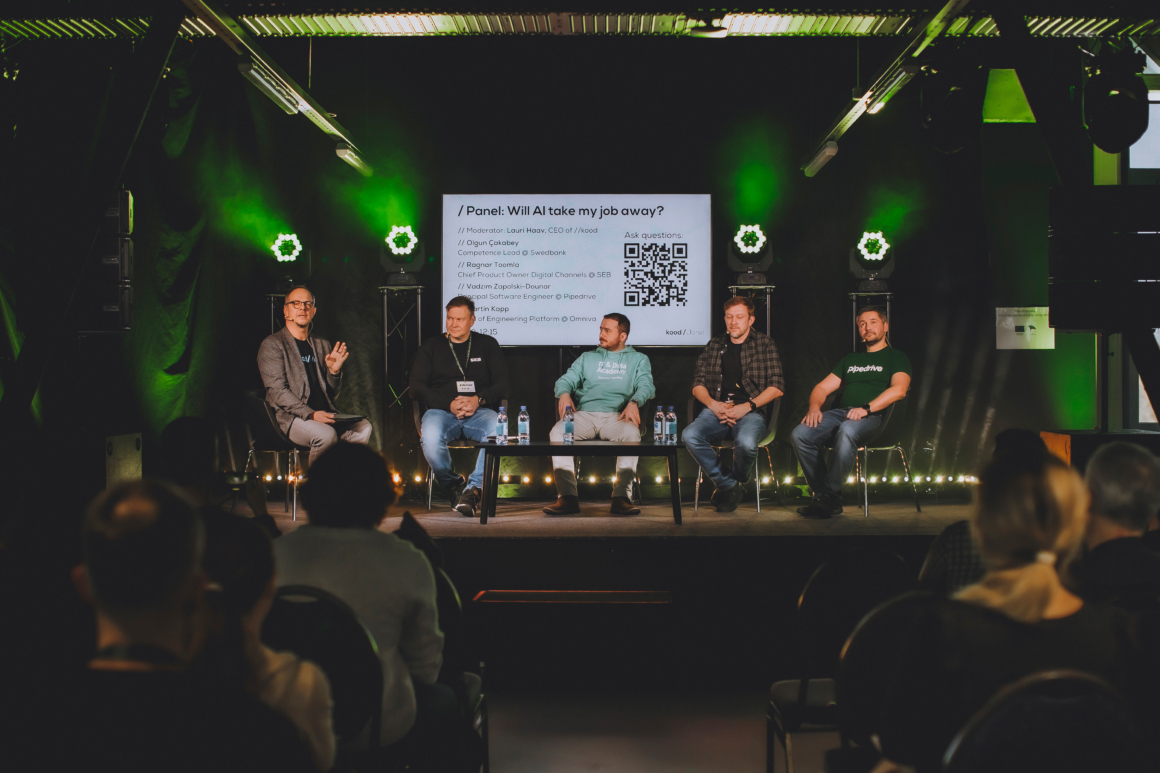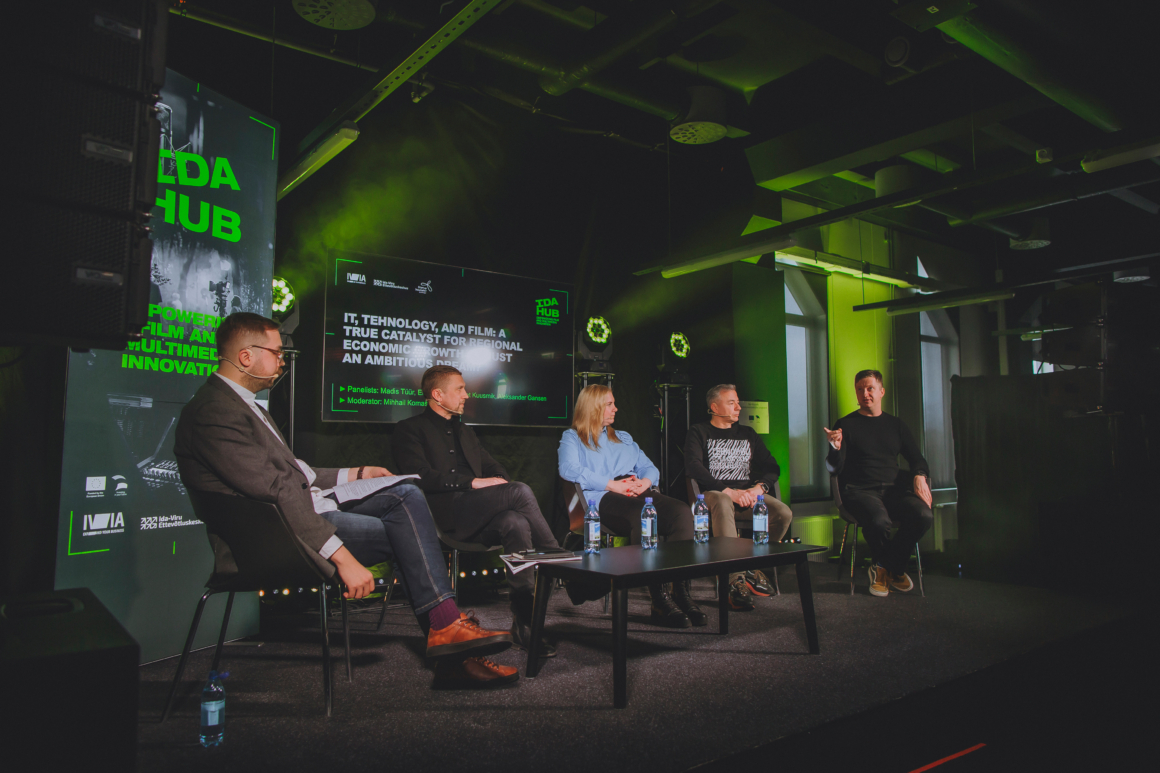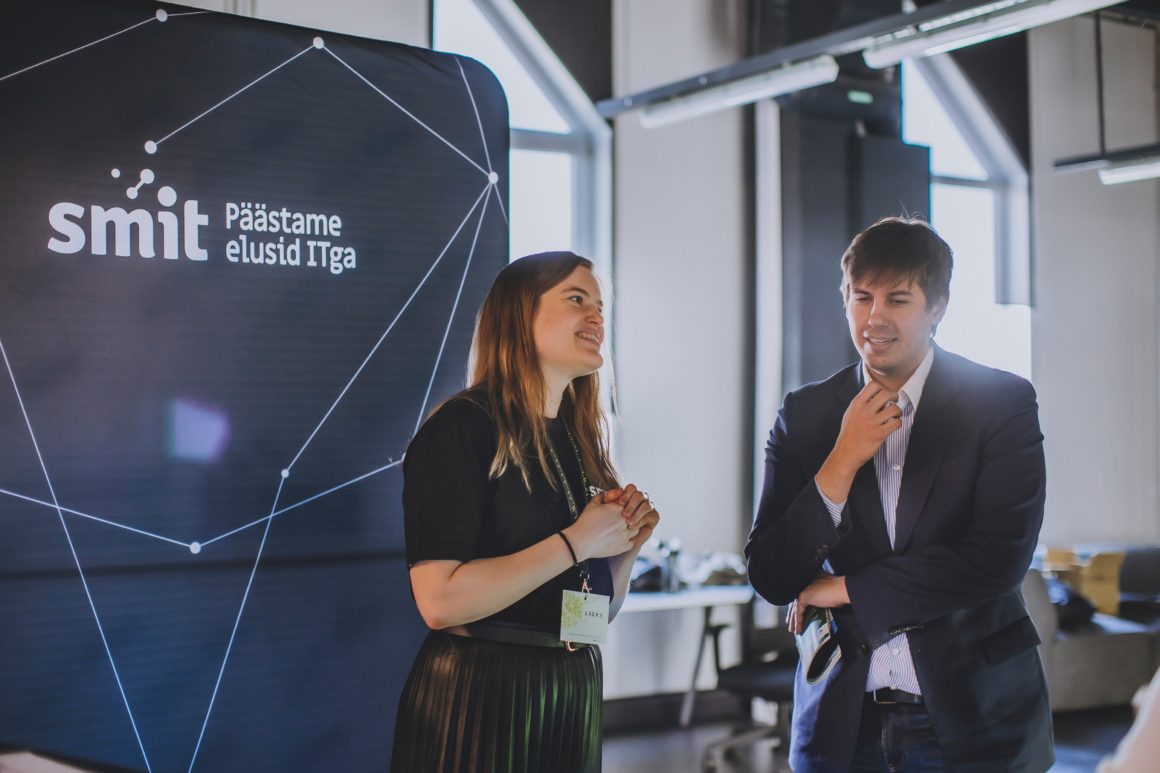Key takeaways from kood/JobFair 2025
kood/JobFair 2025 brought together more than 50 industry experts and over 200 students for a day packed with insights, networking, and career opportunities in kood/Jõhvi. The exhibition area on the fifth floor hosted SEB, Swedbank, Pipedrive, Ida-Viru Tehnopol & IVEK, SMIT, Rush Street Interactive, Omniva, Selkirk Sport, and Finest, all eager to connect with future tech talent.
In addition, attendees had the chance to engage in organised one-on-one conversations with company representatives, and our much-anticipated networking bingo made a return, concluding with a prize draw featuring fantastic gifts from participating companies. The day ended on a high note with a mix-and-mingle session, complete with mocktails and a silent disco.
Opening with inspiration by Sander Aasna: diverse backgrounds are welcome in tech
Beyond the exhibition, the third floor hosted a series of insightful talks and panels on AI, job market trends, and practical career advice. Sander Aasna (SEB) kicked things off with an inspiring keynote for career changers, sharing his own journey from media to product development. He emphasised that diverse backgrounds are a strength in tech and encouraged students to step out of their comfort zones, apply their past experiences, and actively network. Addressing concerns about AI, he reassured that while it is changing the industry, it is here to assist rather than replace, and the demand for skilled professionals remains high.

Will AI take my job? No, but your job will change

One of the key takeaways from the panel “Will AI Take My Job Away?”, moderated by //kood CEO Lauri Haav, was that the choice of programming language is less important than writing clean, readable, and well-structured code. Vadzim Zapolski-Dounar (Pipedrive) likened coding to poetry, explaining that good code can be translated across languages, and AI merely provides additional tools. Ragnar Toomla (SEB) echoed this sentiment, emphasising that problem-solving ability is far more important than syntax knowledge. But will AI take jobs away? Martin Kapp (Omniva) gave a straightforward answer: some roles will evolve, but software developers will always be needed for their analytical and problem-solving mindset. AI literacy, particularly in areas such as prompting AI effectively, is becoming an increasingly valuable skill. Olgun Çakabey (Swedbank) added that data related knowledge will be especially sought after on the job market. Read more here!
Standing out in a crowded market: job hunt advice from Bolt (yes, LinkedIn is still super important!)
Next, Kristina Korobova (Bolt) shared key insights into standing out in today’s competitive job market. kood/Jõhvi students made a strong impression at Bolt last year, securing three out of eight available software engineering internships. While software engineering remains an evergreen career, demand is rising for Data Science, Machine Learning, Cybersecurity, Product Analytics, Cloud Computing, and Site Reliability Engineering. On the other hand, traditional roles such as SCRUM Master and Project Manager are fading as their responsibilities are absorbed by Product Management and Analytics. The hottest hiring industries right now include IT product and service companies, green energy, robotics, fintech, gaming, chemical engineering, and healthcare.
However, technical skills alone will not land you a job, you need to market yourself. Kristina advised students to be active on LinkedIn, sharing their experiences, tagging relevant people and companies, and avoiding AI-generated content. Posting about career navigation, kood/Jõhvi experiences, and industry events increases visibility. Additionally, interview practice is essential; recruiters conduct 20-30 interviews a week and remember candidates based on their attitude, energy, and cultural fit rather than just technical ability.
Low-code, high impact: Selkirk Sport’s startup efficiency tips
The Selkirk Sport seminar by Forrest Berry and Jake Speyer provided a fresh perspective on software development efficiency, focusing on low-code tools as a way to do more with less. Platforms like Zapier and Flutter Flow allow companies to develop, scale, and iterate quickly, making tech solutions accessible even to non-developers. This approach is particularly valuable for fast-growing startups looking to stay agile.
From Narva to Netflix? Ida-Virumaa’s film tech future

The Ida Hub panel (Madis Tüür, Aleksander Gansen, Teet Kuusmik, Elina Dubova, moderator: Mihhail Komaško) explored how Ida-Virumaa is becoming a centre for film and multimedia innovation, with the upcoming film campus providing a new ecosystem for creatives and tech professionals alike. The panelists highlighted that filmmaking is similar to a startup, requiring investment and audience engagement. Estonia’s lack of traditional film infrastructure is actually an advantage, as the industry can leapfrog into digital-first solutions. For software developers, opportunities in CGI, animation, post-production, and sound engineering are expanding, with IT solutions playing an increasingly crucial role in cost-cutting and innovation. Ida Hub provides mentorship, investment, and collaboration opportunities, making it a launchpad for the future of media.
Estonia’s growing tech power: highlights from Nestor & Koppel
A discussion on Estonia’s IT sector on the Nestor & Koppel live podcast recording provided further insights into the industry’s rapid growth. The sector now employs close to 40,000 people, up from around 30,000 a few years ago, and contributes 9% to the economy. With an average salary of €3,500 gross, it remains one of the most attractive career paths. The podcast speakers reinforced the notion that AI will not eliminate jobs but will enhance productivity. As history has shown, technological advancements tend to create new opportunities rather than reduce employment, and Estonia’s IT sector still faces a talent shortage, ensuring strong job prospects for skilled workers.
How to build a successful start-up?

Finally, the Ida Hub startup seminar by Aleksander Gansen focused on building a successful team. Every startup needs a builder and a hustler. One to create the product and one to sell it. As companies grow, roles like UX/UI designers and operations managers become essential. The session also emphasised adaptability: Slack and Airbnb both started as completely different ideas before evolving into the giants they are today. Testing ideas, gathering customer feedback, and continuously refining the business model are crucial for success.
kood/JobFair 2025 was a celebration of learning, networking, and industry collaboration. From AI and job market trends to low-code solutions and film industry innovation, the event provided attendees with invaluable insights and practical career advice. As the tech landscape continues to evolve, the key takeaway remains clear: stay adaptable, keep learning, and actively build your professional network.
Want to hear the full discussions? Watch the panel talks and presentations.
See you all next year!
